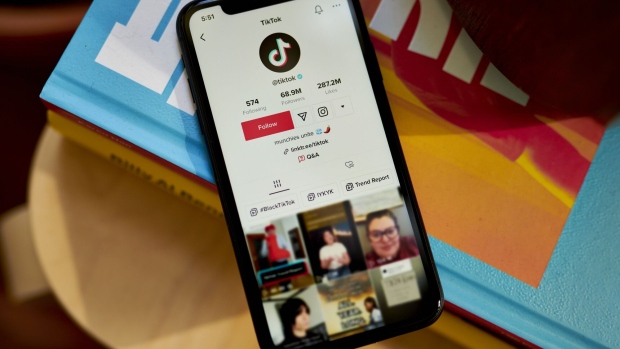May 17, 2023
Montana Becomes First State to Ban TikTok, Setting Up Legal Test
, Bloomberg News

(Bloomberg) -- Montana Governor Greg Gianforte on Wednesday signed a law banning TikTok in the state, setting up the first legal and logistical test for broader efforts to restrict access to the wildly popular video-sharing app in the US.
The law is certain to face legal challenges on constitutional questions of free speech and restrictions on statutes that single out one company. That process will have implications for efforts by Congress to prevent TikTok from operating in the US over concerns that the platform, owned by Beijing-based ByteDance Ltd., could share user data with China.
The Montana law runs through a long list of concerns over TikTok, but it’s short on technical details. It does explicitly prohibit app stores from offering the app to people in Montana, which may prevent new users from joining the platform. However, enforcing the restrictions for current TikTok users could prove more complex.
Under the legislation, TikTok and app stores, like those operated by Apple Inc. and Alphabet Inc.’s Google, could face fines of as much as $10,000 for violations. The text specifies that individual users and law enforcement activities won’t face this penalty.
TikTok spokesperson Brooke Oberwetter said the law violates free speech rights by banning a platform used by “hundreds of thousands of people across the state.”
“We want to reassure Montanans that they can continue using TikTok to express themselves, earn a living, and find community as we continue working to defend the rights of our users inside and outside of Montana,” Oberwetter said.
Spokespeople for Apple and Google both declined to comment.
Read More: TikTok Threat Stems from China’s Data Demand Law, Monaco Says
In an earlier draft of the bill, internet service providers like Verizon Communications Inc. and AT&T Inc. were banned from allowing TikTok to operate in Montana. This prohibition would have applied not just to new users or people scrolling on their phones, but also to anyone trying to access TikTok on a desktop.
That provision was struck from the final version, which makes the nation’s first test of a broad TikTok ban difficult to enforce. Still, Sarah Kreps, director of Cornell University’s Tech Policy Institute, said any restrictions on the app could create friction for users, making the experience less enjoyable.
“I don’t think there’s an a 100% compliance solution for a TikTok ban. Period,” Kreps said. “If we think about what people like about TikTok, it’s that it’s fun and easy to use. So if you introduce impediments to that, the whole kind of use case of TikTok loses its allure.”
Carl Szabo, general counsel for NetChoice, a tech group that includes TikTok and Google among its members, called the law “an unconstitutional attack on a single business.”
The law is set to go into effect Jan. 1 and would become void if TikTok is sold to a company not incorporated in China or any other nation considered an adversary.
Civil liberties and free speech groups have consistently opposed discussion in Congress about banning TikTok. They argue that lawmakers should focus instead on data privacy rules.
The Electronic Frontier Foundation, a nonprofit focused on digital rights, said Wednesday that a TikTok ban is unconstitutional and wouldn’t actually protect Montanans.
Montana was among the two dozen states that have joined the federal government in banning TikTok on official devices. Gianforte on Wednesday also extended that prohibition to all “social media applications that provide personal information or data to foreign adversaries on government-issued devices or while connected to the state network.”
Gianforte’s directive mentioned ByteDance-owned apps CapCut and Lemon8, as examples of social media that would fall under this prohibition on state devices. He also listed Telegram, which was founded in Russia, as well as Temu and WeChat, whose parent companies are based in China.
--With assistance from Alex Barinka.
(Updates with opponents, Gianforte directive, starting in 13th paragraph.)
©2023 Bloomberg L.P.





